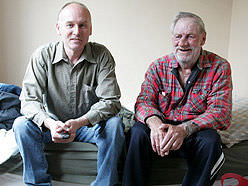Justice Is Served
Martyshuk estimates that of the 208 clients the company currently houses, 100 of them are on medication. A common problem in the beginning of the venture was the high level of drug abuse among residents. “We were suffering overdoses among many of our clients,” says Martyshuk. “They’ll buy (medication), sell it, trade it, steal it—whatever they have to do to get their hands on ‘oxys’ and percs, that kind of thing.”
Oxycodone, or oxys, is a narcotic pain reliever used to treat moderate to sever pain. Percocet, or percs, is a combination drug containing acetaminophen and oxycodone. It’s also prescribed to treat moderate to severe pain.
At this point, most people would throw in the towel, but Martyshuk would not be deterred.
“We can use a lot of creativity, and this is one of the benefits of (getting the) private sector involved,” says Martyshuk, “after our last death, we went out, bought a pharmacy and started regulating medications to our clients.”
The pharmacy was so successful that it turned a profit, which the company uses to finance a housing sustainability fund. “Rent is based on $850 month,” says Martyshuk, “if they earn less than $1,100 a month they qualify for a $300 housing subsidy, whether or not they’re on medication.”
Within the first year of owning the MacDonald Lofts, once notorious for violence and drug related activity, EPS responses to the building were reduced by 74 percent. “That represents about a million bucks (of taxpayer dollars),” says Martyshuk, “eight-hundred dollars per hour for EPS response that doesn’t include the ambulances and fire trucks and everything that comes with it.”
In its own way, Martyshuk Housing has put a private sector spin on social development. The corporation has made a significant dent in homelessness; reduced drug related crimes on its premises, and even cut costs by reducing police responses to the area.
“The reason I think we’re so successful is that we can do it on dimes to the dollar,” says Martyshuk. “We take everybody; we expect to have to pick them up, dust them off, and keep them going.”
Angels in the Alley: grass-roots situational crime prevention
Situational crime prevention increases the risk potentials for the offender, minimizes opportunities for crime, and reduces the payoff of completing a criminal act. According to the CCSD, it includes everything from self-defense classes to comprehensive community planning. The Guardian Angels safety patrols fall somewhere in between.
Established in 2007, the Edmonton Guardian Angels is a volunteer citizen group that patrols the city streets as a crime-deterring presence. Dave Schroder is the chapter leader whose initiative led him to contact Curtis Sliwa, founding member of the original Guardian Angels in New York City.
“I just had this feeling that, although I was busy, involved with volunteer work with our real estate board, I just wanted to do something to just try and make a difference someway,” says Schroder.
Patrols typically consist of three to five people. Before going into the streets, crew members frisk each other for weapons (none are allowed), and police are given a cell phone number and the location of their patrol route. “Absolutely no weapons” says Greg Silver, “we try to use our voices more than our bodies. We try to talk people down.” Silver is chapter leader of the Calgary Guardian Angels, he is also owner of Silver Graphic Design.
In fact, although graduated members are trained in self-defense and conflict prevention, the true purpose is to be a presence that dissuades criminal activity and to engage the community.
“The number of confrontations is minimal,” says Silver, “for the most part it’s all about community support.” Schroder agrees, “Most of our patrols might involve talking to locals, just allowing them to express their frustrations about things that are going on, sometimes it’s (about) walking seniors home.”
“We have a professional police force, they are the ones that are really making the difference in the city in terms of effecting crime rates and truly making the city safer,” says Schroder. “Being realistic, we fully realize that the difference we make is really just where we are at that point in time … two hours later, or two days later, I mean really, things are going to take place as they take place.”
Patrols for the most part involve a sort of advocacy for crime reduction. Their presence sends a message to would-be offenders that the community will not stand for it any longer. What separates the Guardian Angels from other citizen organizations is that, according to Schroder, they are willing to “take it one step further.”
“People know who we are, so the drugs and stuff go away, I’m assuming until we leave. We keep our eyes out, if we see somebody thumping on somebody or doing something that’s dangerous, we’ll intervene,” says Silver.
Contrary to the popular notion that intervention leads to vigilantism, the Guardian Angel’s approach is not physically violent. Schroder explains that before anyone even becomes involved, a team member calls the police. The rest of the team ends the scenario as quickly as possible, usually by creating space between the conflicting parties.
Although members of the Guardian Angels have varying day jobs, they are unified by their desire to see a positive change in their community, one that involves citizens taking back their streets one block at a time. “You have two choices in life,” says Silver, “you can sit on your couch and complain about the way things are or you can try to make some sort of a small change.” Schroder agrees, “I would suggest that if people have the capability, there may be a moral obligation to help people that are in trouble.”

























Share the post "Justice Is Served"